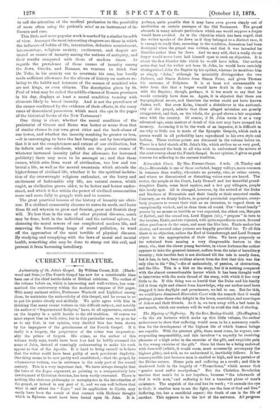Riversdale Court. By Mrs. Forrest-Grant. 3 vols. (S. Tinsley and
Co.)—Riversdale is one of those secluded, happy valleys, more common in romance than reality, whereinto no poverty, vice, or crime enters, and where no discontented or disturbing voices ever are heard. The rector, the people at the Court, Lady Denzell and her beautiful grand- daughter Ennis, some local squires, and a few gay villagers, people this lovely spot. All is changed, however, by the arrival of the Duke and Duchess of Riveradale and their family at their ancestral castle. Contrary, as we firmly believe, to general provincial experience, every- body prepares to resent their visit as an intrusion, to regard them as exceptionally wicked, and to shun them all round. The "ducal family" proves by no means so terrible as was expected, the eldest son, Marquis of Belfort, and the second son, Lord Rippon (sic), "propose " in turn to the heroine, Ennis, and are rejected, with quite superfluous scorn. Several other gentlemen do the same, and meet the like fate. Ennis makes her choice, and several other persons are happily provided for. To all this there is no objection, unless the Earl of Gainsborough and Lord Dormer object to the appropriation of their titles. We have purposely so far refrained from naming a very disagreeable feature in the story, viz., that the clever young barrister, in whose fortunes the author appears to take the greatest interest, suffers from the taint of hereditary- insanity ; this terrible fact is not disclosed till the tale is nearly done, but it has, in fact, been evident almost from the first that this was the only clue to his " fits,"—fits of melancholy, of passion, of abstraction, and the like. This is a blot on the story, but it is nothing compared with the almost unmentionable horror which it has been thought well to intertwine with the main thread of the story, with which it has very little to do. If this thing was so horrid that the Duke and his family hid it from sight and almost from knowledge, why our author need have dragged it into daylight and prominence, we fail to see. But for this, we could have dismissed Riversdale Court with the remark that it would perhaps please those who delight in the loves, courtships, and marriages of dukes and their friends. As it is, we turn away with a bad taste in our mouth, which our readers will do well to avoid the risk of sharing.


































 Previous page
Previous page